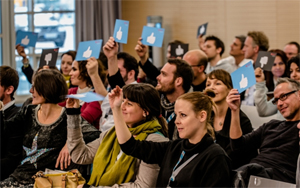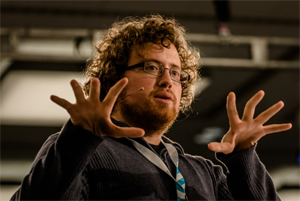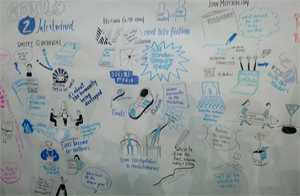Press

(photo: Ben Hartung/ Frankfurt Book Fair)
Fiction is real: Media experts discuss new storytelling trends in Frankfurt
What are the new developments of storytelling? Are the boundaries between fiction and reality blurring? What is the user´s role in the story? StoryDrive, the international conference organised in the framework of the Frankfurt Book Fair, focused on these and other questions concerning new forms of storytelling and pioneering business models. A new generation of stories was presented under the motto "Fiction is real".
The event was conceived in a way to create a participatory environment. Classroom-style lectures and presentations were replaced by spontaneous talks that inspired an artist to produce a conference mind-map. The speakers, set at four tables, were surrounded by the audience, which was provided with "thumbs up" and "thumbs down" cards to agree or disagree with what was being said. Finally the attendees were able to interact with the orators via twitter which allowed them for real-time comments and questions on the presentations.
Augmented reality: How the stories are invading our lives
Drew Dawson, Director of the Entertainment Technology Center at the Carnegie Mellon University in Pittsburgh, USA, gave some examples on how the boundaries between reality and the virtual word are fading away. People are no longer familiar with absolute directions (northward, southward etc ) and they are used to search for places through a screen rather than by observing the world around them. New technologies and software certainly make people´s lives easier but they also allow digital devices, such as GPS phones to collect more and more information about the users. "We could become part of a system or be registered in a database without even realising it," claims Dawson.

(photo: Ben Hartung/ Frankfurt Book Fair)
Big Brother-style oracles raise many questions on the reliability of information and privacy protection but they can also be a source of inspiration for imaginative storytelling: what if that very same phone-GPS mentioned before became the tool to communicate with a secret agency? This is Corey King´s approach. Together with his wife he founded ZenFri Inc, a Canada based startup that merges art, technology and business in a whole new way. Their project, Clandestine Anomaly, has been hailed at conferences around the world as "the most ambitious augmented reality game ever attempted."
In this game the user´s phone is not a wheel or a gun but simply what it is in real life: a phone. The whole story revolves around this object. Indeed, players can call and text each other. What´s more, the game scenario incorporates the actual neighbourhood of each individual player. The ultimate goal is to make the user almost believe that he is actually involved in a sci-fi battle. "Technology is limited, imagination is not," says King. "I am interested in telling people a story they are involved in but it is also the player himself who creates the story."

(photo: MFG Innovation Agency)
The Copernican revolution: The user takes over the story
All kind of users - costumers, players, readers etc - are more and more involved in the production processes: from the Ikea costumer who puts together his own furniture to the online buyer that proposes a design idea to his favourite web shop of t-shirts. "Also, storytelling is more and more user-centred," explains John Mitchinson, co-founder of the publishing company Unbound, UK. Mitchinson believes that books belong in the hands of the readers even before they are published. This is why the readers can check on the writers' ideas at Unbound´s website before the artists even start writing. If the users like the submitted concept they can pledge to have it published. Once the target number of supporters is reached the author can go ahead and start writing.
Dmitry Glukhovsky, Russian author and journalist, tried another way: he became a self-publishing pioneer. In the late 1990s he wrote "Metro2030", a futuristic novel set in Moscow´s underground, which was completely ignored by the Russian publishers. Therefore, in 2002 he started uploading the novel´s chapters on his own website as an interactive experiment. The users were able to comment through a forum and even improve the book. "For example, ex-soldiers pointed out the mistakes I made when I described underground bunkers. Those were details I could not know as a school boy," explains Glukhovsky.

(photo: B. Hartung/ Frankfurt Book Fair)
Some years later, the novel came out as a printed book and became a success. Having sold close to 600.000 copies in Russia alone, it was then translated into 35 languages. Millions of people have read the free text of the novel on its official website, which provides wannabe writers with a section to publish their own stories about the world of "Metro 2033." Through the online platform, the fans check on each other to keep the storyline consistent and they interact to keep developing the universe of the book. The writer himself also created the scripts of the two video games inspired by his novel: "Metro 2033" and "Metro: Last Light."
Glukhovsky´s story shows the importance of thinking out of the box. "Publishing online for free doesn't decrease the chances that the users will buy the book. If they get hooked with the story they will also purchase the printed version," says the author. According to him, self-publishing and online writing do not represent the end of the books but just their natural evolution. "Even if books as we know them should die, literature will exist forever," he concludes.

(image: Ben Hartung/Frankfurt Book Fair)
The future of storytelling: Steering clear of the McDonald´s effect
The stories presented during the conference showed that new forms of storytelling can be fostered by technology. Nonetheless, the challenges and the potential defaults of the combination between fiction and new media were also analysed. One of the keynote speakers of the event, Gunter Dueck, is not only the Chief Technology Officer of IBM Germany, but also a writer, a philosopher and a mathematician. Embodying the best of both worlds, he spoke about the right balance between technology and a good story.
According to the expert, the more digital communication techniques become sophisticated the higher is the risk that technology overtakes the content. "Selling old ideas with new technologies is good for business, but not for art," glosses Dueck. Having a good idea or a good story to tell is still the main point. If storytellers only relied on the capacity of technologies to make the message sound appealing all stories would be standardized. It is like eating at McDonald while on holiday instead of trying local dishes: it may be reassuring, cheap and fast but it spoils a whole part of the journey, the one during which the traveller experiences new flavours.
(Source: Click Here)































